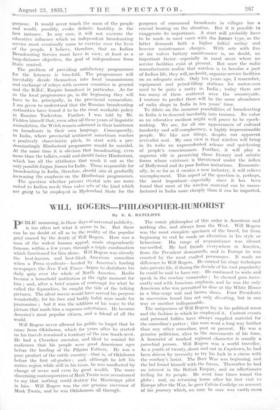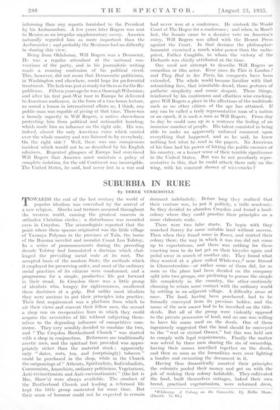WILL ROGERS PHILOSOPHER-HUMORIST
By S. K. RATCLIFFE
DUBLIC mourning, in these days of universal publicity, is too often not • what it •seems to be. But there can be no doubt at all as to the reality of the popular grief caused by the death of Will Rogers. Here was a man of the widest human appeal, made stupendously famous, within a few years, through a triple combination which functioned for him alone. Will Rogers was already the best-known, and best-liked, American comedian when a Press syndicate—headed by America's leading newspaper, the New Pork Times—began to distribute his daily quip over the whole of North America. Radio became a household institution at the right moment for him ; and, after a brief season of contempt for what he called the Squawkies, he caught the tide of the talking pictures. The silent movie would have served his purpose wonderfully, for his face and bodily habit were made for pantomime ; but it was the addition of his voice to the picture that made him a supreme entertainer. He became America's most popular citizen, and a friend of all the world.
Will Rogers never allowed his public to forget that he came from Oklahoma, which for years after he started on his travels remained a territory of the raw South-west. He had a Cherokee ancestor, and liked to remind his audiences that his people were good Americans ages before the landing of the Pilgrim Fathers. He was a pure product of the cattle country—that is, of Oklahoma before the first oil-gusher ; and, although he left his native region while still in his teens, he was unaffected by change of scene and even by great wealth. The more discerning contemporaries of Mark Twain were accustomed to say that nothing could destroy the Mississippi pilot in him. Will Rogers was the one genuine successor of Mark Twain, and he was Oklahoman all through. The comic philosopher of this order is American and nothing else, and always from the West. Will Rogers was the most complete specimen of the breed, for from beginning to end he made no alteration in his style or behaviour. His range of acquaintance was almost 'unexcelled. He had friends everywhere in America, from the President downwards, and in Europe lie was courted by the most exalted personages. It made no difference to Will Rogers. He carried his stage technique into private life, if during the decade of his vast popularity he could be said to have any. He continued to write and speak in the cowboy vernacular ; he chewed guM inces- santly and with ferocious emphasis, and he was the only American who was permitted to dine at the White House in a blue-serge suit and brown shoes. Four Presidents in succession found him not only diverting, but in one way or another indispensable. The uniqueness of Will Rogers lay in his political sense and the fashion in which he employed it. Current events and personal foibles have always supplied material for the comedian's patter ; this man went a long way further than any other comedian, past or present. He was a genuine politician, alive to the movements of his time. A humorist of marked regional character is usually a parochial person. Will Rogers was a world traveller. As a youth of twenty, down and out in Capetown, lie had been driven by necessity to try his luck in a circus with the cowboy's lariat. The Boer War was beginning, and the lad found himself with the forces. Thereafter he had an interest in the British Empire, and an affectionate feeling for its people. He went four times round the globe ; and, on returning home after his first visit to Europe after the War, he gave Calvin Coolidge an account of his journey which, we may be sure was vastly more informing than any reports furnished to the President by his Ambassadors. A few years later Rogers was sent to Mexico as an irregular supplementary envoy. America naturally regarded him as more important than the Ambassador ; aid probably the Mexicans had no difficulty in sharing this view.
Being from Oklahoma, Will Rogers was a Democrat. He was a regular attendant at the national con- ventions of the party, and in his journalistic writing made a running confession of his political creed. This, however, did not mean that Democratic politicians, in Washington and elsewhere, could hope for preferential treatment. The lash was just as ready for them as for the Re- publicans. Fifteen years ago he was a thorough IrVilsonian ; and after his first post; War tour in Europe he delivered to American audiences, in the form of a two-hours lecture, as sound a lesson in international affairs as, I think, any public man was capable of giving at that time. There was a homely sagacity in Will Rogers, a native shrewdness protecting him from political and nationalist humbug, which made him an influence on the right side. His was, indeed, almost the only American voice which carried over the whole country and was listened to by everybody. On the right side ? Well, there was one conspicuous incident which would not be so described by his English admirers. Repeated glimpses of Europe had convinced Will Rogers that America must maintain a policy of complete isolation, for the old Continent was incorrigible. The United States, he said, had never lost in a war and had never won at a conference. He mistook the World Court at The Hague for a conference; and when, in March last, the Senate came to a decisive vote on America's • entry, Will Rogers was allied with the Hearst Press against the Court. In that decision the philosopher- humorist exercised a much wider power than the radio- priest, Father Coughlin, to whom the victory of the Diehards was chiefly attributed at the time.
One need not attempt to describe Will Rogers as comedian or film actor. Ever since So This is London ! and They Had to See Paris, his conquests have been extended. The whole world became familiar with that astonishing face, that inimitable drawl, those, gestures of pathetic simplicity and comic despair. These things, reinforced by his continuous and effortless wise-cracking, gave Will Rogers a place in the affections of the multitude such as no other citizen of the age has attained. • If any can be called a truly representative man of a nation or an epoch, it is such a man as Will Rogers. From day to day he could sum up in a sentence the feeling of an immense number of people. His talent consisted in being able to make an apparently unforced comment upon everything that happened, and as he said, he knew nothing but what he read in the papers. No American of his time had his power of hitting the public enemies of his country, or a keener sense of their terrible significance in the United States. But was he not peculiarly repre- sentative in this, that he could attack them only on the wing, with his constant shower of wise-cracks ?



































 Previous page
Previous page